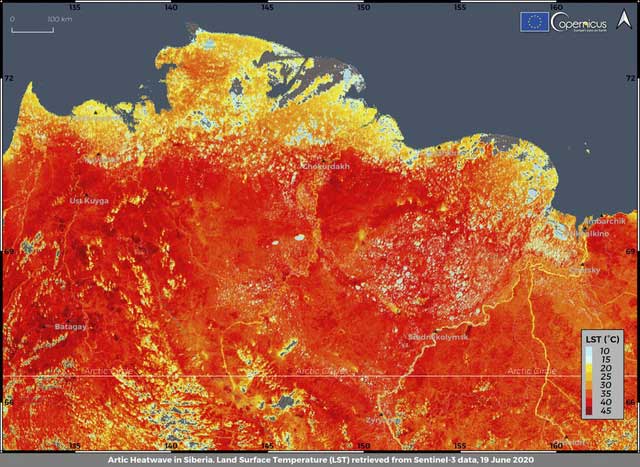Scientists 'disorder' because of an unprecedented phenomenon in the Arctic
The AP posted that the Arctic temperature is constantly rising, causing scientists to worry about the consequences that the rest of the world will suffer.
Last Saturday (June 20), the temperature measured in the Russian town of Verkhoyansk, reached a record 38 degrees Celsius - unprecedented heat levels in the northern Arctic Circle. . On Tuesday, the World Meteorological Organization said it was redefining the accuracy of this temperature.

The photo shows the temperature on the ground of Russia's Siberia. The record high temperature of 38 degrees Celsius measured here has made many scientists worried (photo: Copernicus Climate Change Agency)
" Arctic burning under both figuratively and literally - it is warming faster than we predicted about its response before the level of CO 2 increases and the phenomenon of the greenhouse effect in the atmosphere rights, which leads to the state melting quickly and increasing forest fires , " said climate scientist Jonathan Overpeck from the University of Michigan. "A record high temperature in Siberia is a warning signal."
This year, much of Siberia recorded an unusually high temperature. From January to May, the average temperature in central northern Siberia has increased by more than 8 degrees compared to the average temperature in previous years.
Siberia is considered to be one of the most extreme climates on Earth. This is where the temperature has changed "terribly" to 106 degrees, from -68 degrees to 38 degrees Celsius.
For scientists like Mr. Overpeck, it's time to "sound the alarm bells" . Such a prolonged heat phenomenon in Siberia has not existed for thousands of years and "is another sign that the Arctic is affected by global warming more than we think".
The Arctic region of Russian territory is also one of the places with the fastest rising temperatures in the world.
The reason for the rising temperatures in Siberia is attributed to the increasing number of forest fires each year and the melting of permafrost (permafrost) . According to an environmental expert from Alaska University University Katey Walter Anthony, the melting ice sheets release huge amounts of methane into the atmosphere and spread around the globe. "The methane from the North Pole does not stay in the North Pole but affects the whole world," Katey said.
And climate expert Judah Cohen from Boston's Environmental Research firm warns that what happens in the Arctic could affect the weather of both the United States and Europe.
In the summer, unusually high temperatures narrow the temperature and pressure differences between the North Pole and lower latitude areas where many people live. This contributes to extreme weather events such as hot weather and showers that can last longer in the same place.
- 7 irreplaceable roles of the Arctic sea ice
- Ice in the Arctic is likely to disappear by 2030
- The volume of ice in the Arctic drops to a record low
- Arctic ice is melting record fast
- Arctic will melt ice after 5 years
- Warming in the Arctic will affect Vietnam
- Russia explains the phenomenon of the ozone layer in the Arctic
- Unable to salvage the Arctic phenomenon
- The inevitable phenomenon of warming in the Arctic
- Unusual weather now originates from the strange phenomenon in the North Pole
- Detects shock under the Arctic ice shelf
- Abnormal melting ice alarm in the Arctic
 Is the magnetic North Pole shift dangerous to humanity?
Is the magnetic North Pole shift dangerous to humanity? Washington legalizes the recycling of human bodies into fertilizer
Washington legalizes the recycling of human bodies into fertilizer Lightning stone - the mysterious guest
Lightning stone - the mysterious guest Stunned by the mysterious sunset, strange appearance
Stunned by the mysterious sunset, strange appearance